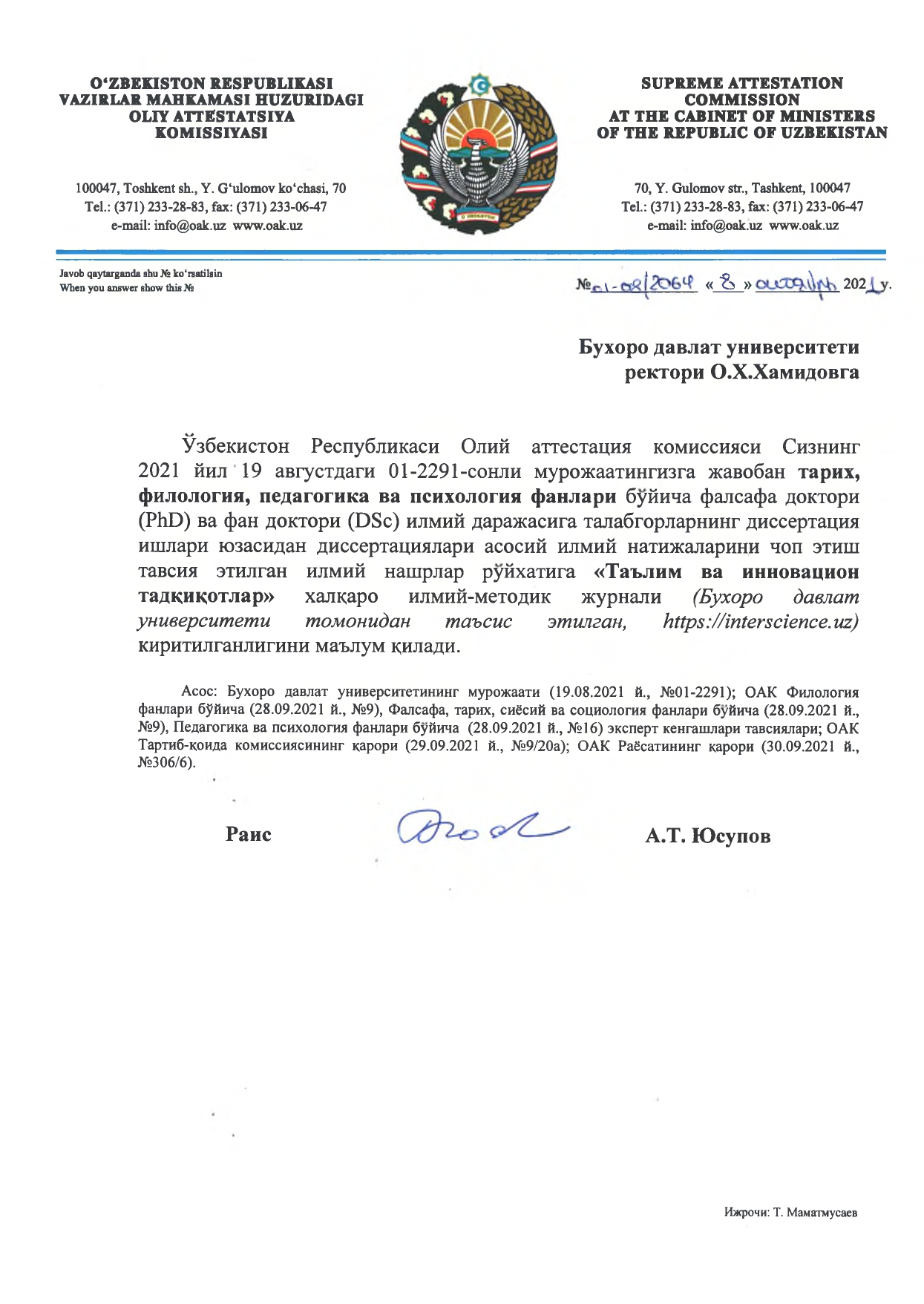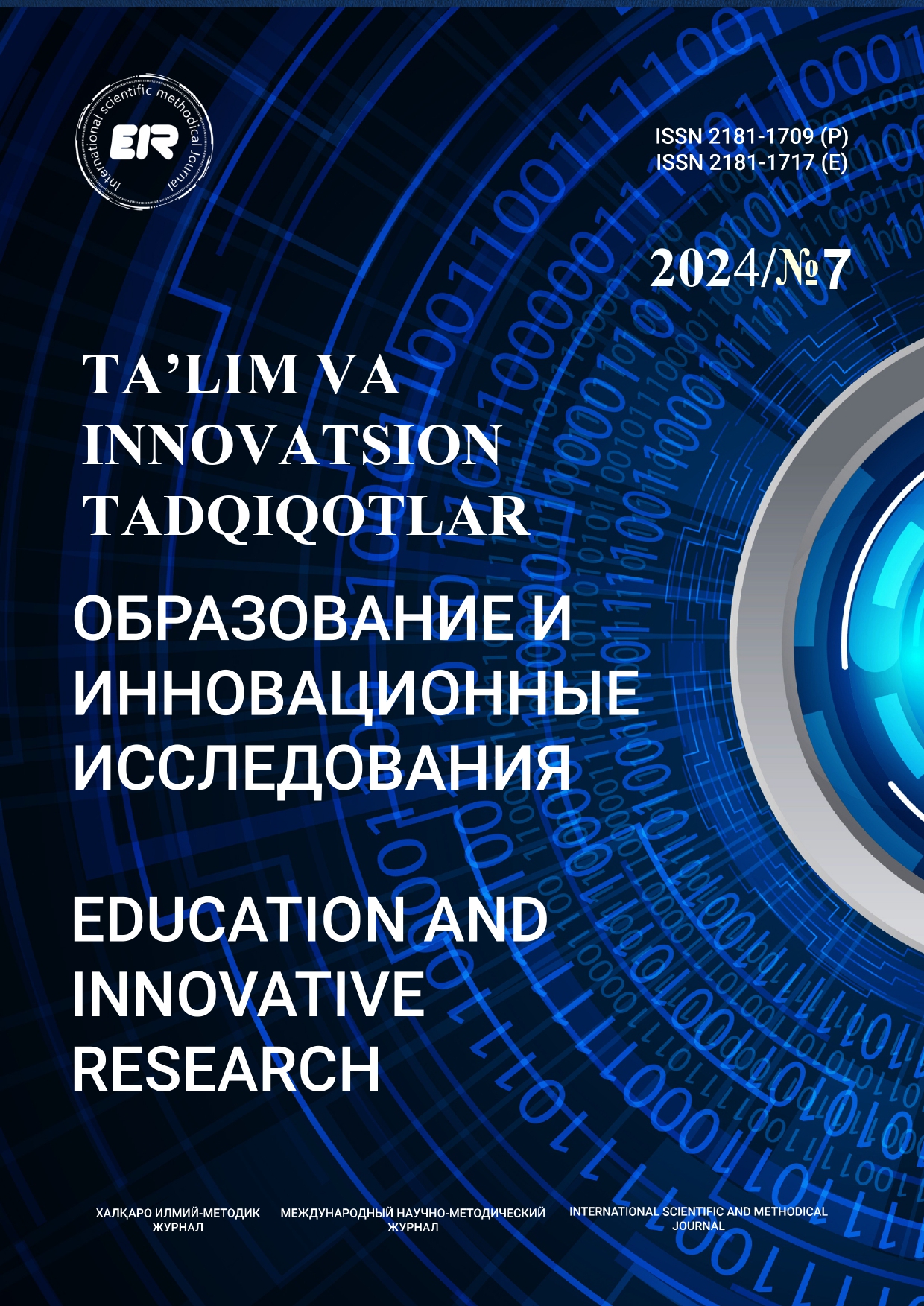TIBBIYOT OLIY TA’LIM MUASSASALARI TALABALARIDA AUTENTIK MATERIALLAR ORQALI MANTIQIY TAFAKKURNI RIVOJLANTIRISH STRATEGIYALARI
Nematova Zebo Tursunboyevna, o’qituvchi, Buxoro davlat tibbiyot instituti
Ключевые слова:
mantiqiy fikrlash, haqiqiy materiallar, tibbiy ta’lim, tanqidiy fikrlash, muammolarni hal qilish , dalillarga asoslangan qarorlar qabul qilish, vaziyatga asoslangan fikrlash, real dunyo simulyatsiyasi, fanlararo yondashuv, reflektiv yozish, murabbiylik, texnologiya integratsiyasi, baholash.Аннотация
Ushbu maqola oliy tibbiyot muassasalari talabalarining mantiqiy tafakkurini haqiqiy materiallardan foydalanish orqali rivojlantirishni o’rganadi.
Haqiqiy materiallar tibbiy amaliyotning murakkabligi va qiyinchiliklarini aks ettiruvchi real hayot manbalari va stsenariylariga ishora qiladi. Tibbiy ta’limda haqiqiy materiallarning integratsiyalashuvi tanqidiy tahlil qilish, muammolarni hal qilish va dalillarga asoslangan qarorlar qabul qilish imkoniyatini yaratib, talabalarning mantiqiy fikrlash qobiliyatini oshiradi. Maqolada haqiqiy materiallarni o’z ichiga olishning turli strategiyalari muhokama qilinadi, masalan, vaziyatga asoslangan fikrlash, real dunyo simulyatsiyalari, fanlararo yondashuvlar va aks ettiruvchi yozish. Bu mantiqiy fikrlashni rivojlantirishga yordam berishda murabbiylik, texnologiya integratsiyasi va doimiy baholashning muhimligini ta’kidlaydi. Topilmalar o‘quvchilarning mantiqiy fikrlash qobiliyatini rivojlantiruvchi, ularni tibbiyot kasbining murakkabliklariga tayyorlaydigan qulay o‘quv muhitini yaratish muhimligini ta’kidlaydi.
Библиографические ссылки
Abrami, P. C., Bernard, R. M., Borokhovski, E., Waddington, D. I., Wade, C. A., & Persson, T. (2015). Strategies for teaching students to think critically: A meta-analysis. Review of Educational Research, 85(2), 275-314.
Durning, S. J., Artino, A. R., Boulet, J. R., Dorrance, K., van der Vleuten, C., &
Schuwirth, L. (2012). The impact of selected contextual factors on experts’ clinical reasoning performance (does context impact clinical reasoning performance in experts?). Advances in Health Sciences Education, 17(1), 65-79.
Hmelo-Silver, C. E. (2004). Problem-based learning: What and how do students learn? Educational Psychology Review, 16(3), 235-266.
Huang, C. D., Yang, P. C., Chuang, M. T., & Chan, C. Y. (2015). Problem-based learning vs. case-based learning in an internal medicine clerkship: a comparison of student satisfaction and process difficulty. Advances in Health Sciences Education, 20(2), 425-437.
Mamede, S., Schmidt, H. G., Rikers, R. M., & Penaforte, J. C. (2007). Effects of reflective practice on the accuracy of medical diagnoses. Medical Education, 41(5), 468-475.
Norman, G., Young, M., Brooks, L., & Nonnemaker, S. (2007). Educational games for health professionals. Medical Teacher, 29(1), 33-38.
O’Brien, C. L., Bass, E. J., & Hobson, E. H. (2016). Using authentic materials in medical education. Journal of Graduate Medical Education, 8(2), 268-271.
Petrides, K. V., & Furnham, A. (2000). On the dimensional structure of emotional intelligence. Personality and Individual Differences, 29(2), 313-320.
Seery, M. K. (2009). Critical thinking: Assessing online discussions in higher education. Innovate: Journal of Online Education, 5(2), Article 4.
Williams, B., Brown, T., & McKenna, L. (2010). Students’ perceptions of using video clips as a pre-learning tool for laboratory preparation. Nurse Education Today, 30(8), 780-784.
Nematova , Z. (2023). The methods of developing logical thinking using authentic materials in the classroom. International Bulletin of Applied Science and Technology, 3(3),183– 188.Retrieved from https://www.researchcitations.com/index.php/ibast/article/view/749
Nematova Zebo Tursunboevna. (2023). The usage of authentic materials in the language classroom. International Journal of Literature and Languages, 3(02), 68–73. https:// doi.org/10.37547/ijll/Volume03Issue02-13
Zebo Nematova Tursunboevna. (2023). Authentic materials as an essential part of formation of communicative competence. Academia Repository, 4(10), 217–224. Retrieved from https://academiarepo.org/index.php/1/article/view/64 14 Tursunboyevna, N. Z. (2023). Methods of Using Innovative Education in Developing Logical Thinking of Students. American Journal of Language, Literacy and Learning in STEM Education (2993-2769), 1(10), 687-693.
Nematova Zebo Tursunboevna. (2023). The Importance of Logical Thinking Skills and Methods Developing Them. American Journal of Language, Literacy and Learning in STEM Education (2993-2769), 1(10), 41–46. Retrieved from http://grnjournal.us/index. php/STEM/article/view/1789





